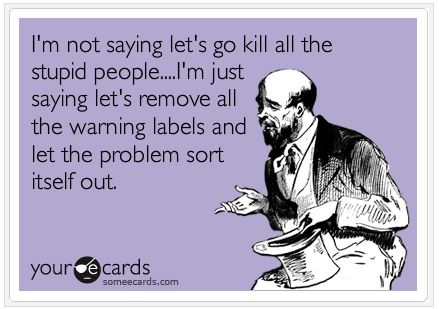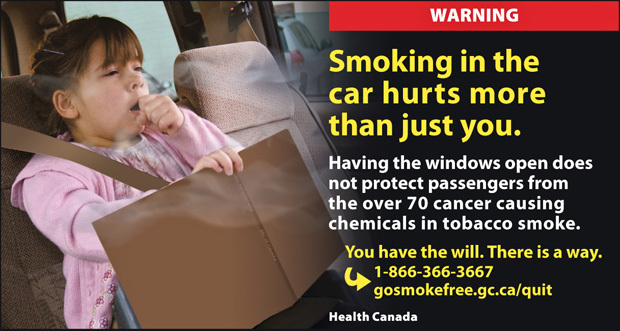Every now and then we hear people calling for warning labels on food with high salt, sugar or fat content. Is this a good idea?
We have all heard about the evils of salt, sugar and fat. All of these are good in moderation, and are found in almost everything we eat.
But our modern packaged-food society seems to get an overdose of all three. Most packaged foods have extra salt, sugar and fat added to provide artificial taste, texture and preservation.
In case you’ve been living with your head in the sand, here are the evils of salt.
Here are the evils of sugar.
Here are the evils of fat.
Wow. With all this evil in our food, shouldn’t there be warning labels? Like on cigarette packages, warning us about lung cancer and other ailments? Like warnings to pregnant women to avoid drinking alcohol?
I am sure there are plenty of people who understand the evils of salt, who would love to see this warning sign on food packages. And the same for sugar. And the same for fat. And food coloring. And various unpronounceable ingredients.
For those who are wearing a bewildered look, here are some of the reasons.
- To raise awareness of the evils of salt. Or sugar. Or fat. Etc.
- To embarrass companies into putting less evil into their boxes and pouches, or to offer evil-free versions for health-conscious consumers.
- To help people compare products and make healthier choices.
All these are valid goals and it is even possible that they would be achieved. Society might be moved somewhere in a healthier direction overall.
READ ALSO: What smoking has taught us and our children.
However, there are also some good arguments against such a move, that it would be counterproductive.
- There are already so many warning labels around. My car manual has 249 warnings – countless pages in total! If there were 2 or 3 warnings, I would read them. But when several pages are devoted to such obscure warnings as: “Be sure everyone in your vehicle is in a seat and using a seat belt properly.” I don’t bother. Car owners are numbed by warning label fatigue.
- Despite the litany of evil listed above, these issues are not as black and white as cigarette smoking or pregnant drinking. Those are not activities to do in moderation; those are activities to be avoided. But nobody is suggesting to eliminate all salt, sugar or fat (food coloring, maybe, but not many people are suggesting that yet).
- There is no agreement on what is a good amount of salt, sugar or fat for a typical person, and certainly not for each individual.
- Eating too much salt, sugar or fat harms nobody but yourself; there is less of an imperative to curb such activities than to curb alcohol or second-hand smoke.
- While it is true that obesity taxes health care resources, perhaps even more so than smoking, it is hard to pin the blame specifically on sugar or fat; all calories are responsible.
- Even the harsh warnings on smoking and the millions of dollars spent on anti-smoking messaging have had only a limited effect.
- Due to warning message fatigue, food warnings might even make anti-smoking warnings less effective by overloading people with so many warnings that people ignore them all
- People like the benefits of salt (taste and preservation) and of sugar (taste) and of fat (taste). Convincing people to moderate is tough enough, but a “warning” would make many people think the whole thing has gone too far. There would most likely be a huge public backlash.
- There already are warning labels on some foods: “May contain traces of nuts.” How many warnings will people put up with when they want to see food as something wholesome, not as a threat.
On a lighter note, maybe we should follow the advice of Joe Jackson introducing his song, “Cancer”: “It shouldn’t be taken too seriously, OK?”
READ ALSO: The healthiest frozen treat ever!






Does anyone really believe that a warning label on a box of Girl Scout Thin Mints will make us stop buying and eating them? Or, one on top (and the sides) of Chunky Monkey ice cream?
No, I doubt it.
I don’t know anyone else but I feel stupid when I see those warnings. If you buy cake it will contain sugar, if you by pickle it will contain salt. am I stupid that I should be warned about them? I have seen a warning on butter saying “contains milk”. Really, I am so ignorant that I didn’t know butter could contain milk.
If people don’t care to find out what is good and what is bad for them why would they bother to check the warnings? Besides, are we going to stop with a warning or explain why is there warning as well. Where is it going to stop? If someone wants to know about health benefits or dangers of sugar, salt or whatever, they can quickly type in their favorite search engine “is salt bad” and they learn.
You cannot really teach a grown person what to eat anymore. If there is anything that should be done, there it should be included in primary school curriculum to teach healthy eating. No, what we do is offer them junk food in school canteens.
Companies do put warnings, not because they care about their customers well being. They just don’t want to be sued.
I don’t know is it good or bad. But warning labels on food is just one of the safety measures for manufactures not for customers.